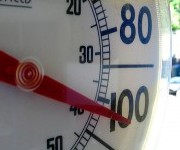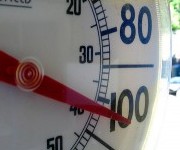
A reliable indicator of economic turmoil. (Photo by Joe Chung.)
An increase in temperature has a measurable impact on national economic health. Imagine how terrible it would be if we were expecting temperatures to rise significantly over huge swaths of the world!
Even temporary rises in local temperatures significantly damage long-term economic growth in the world’s developing nations, according to a new study co-authored by an MIT economist.
Looking at weather data over the last half-century, the study finds that every 1-degree-Celsius increase in a poor country, over the course of a given year, reduces its economic growth by about 1.3 percentage points. …
One consequence of this, borne out in the data, is that the higher temperatures in a given year affect not only a country’s economic activity at the time, but its growth prospects far into the future; by the numbers, growth lagged following hot years.
The impact isn’t only in productivity. It carries over into politics.
[Researchers] also integrated data about forms of government into the study, and found that temperature shocks are associated with an increase in political instability. A 1-degree-Celsius rise in a given year, they found, raises the probability of “irregular leader transitions,” such as coups, by 3.1 percentage points in poor countries. In turn, the authors write, “poor economic performance and political instability are likely mutually reinforcing.”
Remember: We’re only talking about temperature rise. Researchers “[did] not try to account for all the possible problems that could be generated by long-term climate change, such as rising oceans, floods or increased storms.” If a country suddenly becomes Atlantis, odds are that economic production would also decrease.
Should you not yet be depressed, here’s the kicker.
However, this only applies to the world’s developing nations; wealthier countries do not appear to be affected by the variations in temperature.
Which is why in the year 2056, President Suri Cruise will be forced to write a formal note of apology to the nations whose economies and social fabrics have been damaged by our long-term carbon pollution.
The note will be placed into a bottle and set adrift during high tide from a second-floor window of the White House.
Hat-tip to Chris Mims.



